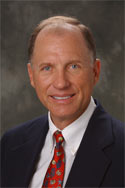September 11, 2008
As retirement nears, Kohler collects honors
CARBONDALE, Ill. -- A long-time professor and fisheries educator at Southern Illinois University Carbondale is raking in honors this year as he prepares to retire.
Christopher C. Kohler, professor and outgoing director of the Fisheries & Illinois Aquaculture Center at SIUC, said the awards, which recognize his research, scholarship and teaching ability, overwhelm him.
Kohler, who is currently living in North Carolina, plans to retire Oct. 1. He said the awards are a pleasant way to finish a career that started at SIUC almost 30 years ago.
“I’m really honored and wasn’t expecting any of those, so for all this to happen at this point of my career is almost a storybook ending,” Kohler said. “Each of these awards is very nice in its own way. I feel really good about how my career has gone, and being recognized like this is a perfect way to go out.”
Kohler received four awards from four different organizations in the last few months. The awards include:
• The Stephen A. Forbes Award of Excellence from the Illinois Chapter of the American Fisheries Society. The award recognizes Kohler’s lifetime contributions and achievements in fisheries sciences.
• The Distinguished Alumnus Award from St. Mary’s College of Maryland, where Kohler earned his Bachelor of Science degree.
• The Gerald H. Cross Alumni Leadership Award from the College of Natural Resources at Virginia Tech University, where Kohler earned his doctorate.
• The Award of Excellence in Fisheries Education from the American Fisheries Society. The award, given to just one fisheries educator in North America each year, recognizes Kohler’s many contributions to teaching and mentoring graduate students and for a textbook he co-edited. “I am most proud of this honor,” Kohler said.
Even though he is retiring, Kohler will remain active in his own research and with SIUC. He continues to mentor several students and is finishing up several grant-funded research projects, which will keep him connected to the University for at least a couple more years on a part-time basis.
Kohler also will work as co-editor of the top scholarly publication, “North American Journal of Aquaculture.”
James E. Garvey, interim director of the Fisheries & Illinois Aquaculture Center, said Kohler’s service to the University and the discipline has been important.
“On a personal level, he has contributed greatly to my growth in fisheries and I have seen similar effects on many of his students and colleagues,” Garvey said. “It will be hard for me to see him leave our program, but I fully expect him to stay quite active in the years to come and this will be sure to benefit the fisheries science program at SIUC.”
As a researcher, Kohler’s work covered several important areas during his nearly three decades at SIUC. He first concentrated on aquaculture with an international flavor, working on projects in Brazil, Haiti, Panama and the Caribbean. Later, he moved into fisheries management practices and issues.
During the last few years, he has focused on food nutrition for fish, specifically studying ways to maximize their level of fatty acids, which are healthy for humans who eat the fish as well as the fish themselves. Some of the research revealed it was possible to feed fish foods that contained saturated fats early in their growth cycles before finishing them with the fatty acids, which contain unsaturated fats, and still get good results.
“It’s cheaper, more sustainable and it still produces a fish every bit as healthy for human consumption,” he said.
Kohler said his approach to teaching students was heavily influenced by his research.
“Good researchers often make for good teachers because they’re bringing what they’re learning into the classroom with passion,” he said. “We are teaching things that are not even in the textbooks yet.”
Kohler was the fourth director of the Fisheries & Illinois Aquaculture Center, which traces its roots back to 1950. It has six faculty members, including the director, and receives funding from local, state and federal agencies. Using a wide array of watercraft and state-of-the-art laboratories, the center specializes in research regarding fisheries management, ecology, toxicology, genetics and aquaculture.
Kohler said he feels that the center is well positioned for success in the coming years. He became director there in 1999.
“We are in the forefront nationally and I anticipate that to continue,” he said. “The infrastructure is there, the recognition is there. People come and go, but the program will remain strong.”

